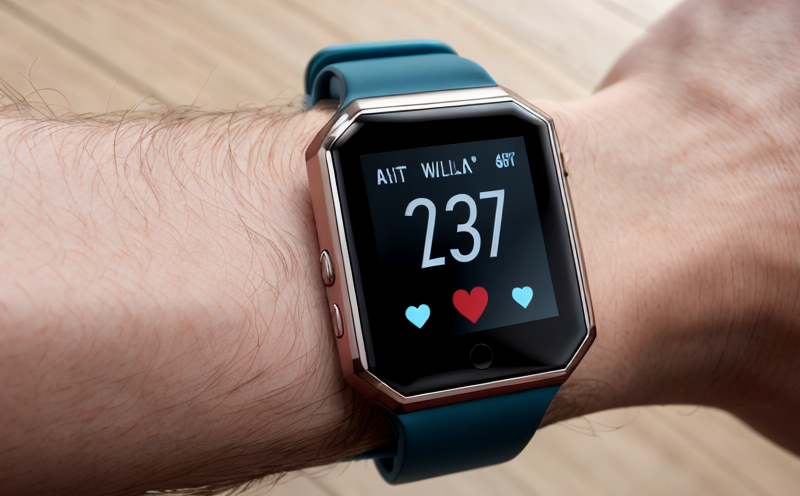IEEE 11073 Interoperability Testing for Wearable Health Devices
The IEEE Standard 11073-20702 specifies a framework for interoperability of health-related data among medical devices, with particular emphasis on wearable health devices. This standard ensures that patient information can be shared seamlessly across various platforms and devices, enhancing the overall efficacy and safety in healthcare delivery.
Our laboratory specializes in providing comprehensive IEEE 11073-20702 interoperability testing services for wearable health devices such as fitness trackers, heart rate monitors, glucose meters, and other digital health solutions. This service ensures that your device complies with the latest international standards and meets all regulatory requirements.
The testing process involves rigorous evaluations of various aspects including data exchange protocols, security measures, and privacy settings. We use state-of-the-art equipment to simulate real-world scenarios which are crucial for identifying potential issues before they impact end-users or patients.
By partnering with us, you gain access to industry-leading expertise in medical device testing, ensuring that your product not only meets but exceeds the stringent requirements set forth by IEEE and other regulatory bodies. Our team of certified professionals employs advanced methodologies to conduct thorough assessments, providing detailed reports that highlight areas for improvement as well as compliance status.
Our services go beyond mere certification; they encompass a commitment towards continuous innovation and improvement within your organization's product development cycle. With our support, you can rest assured knowing that your wearable health device will perform reliably under all conditions while safeguarding user data integrity and privacy.
To better understand the significance of this standard in relation to your specific needs, let’s delve into some key points:
- The importance of interoperability for improving patient care
- How compliance with IEEE 11073 enhances trust between patients and healthcare providers
- The role of secure data transmission protocols in protecting sensitive health information
In summary, IEEE 11073-20702 interoperability testing is essential for ensuring that wearable health devices operate effectively within the broader ecosystem of connected medical technologies. By leveraging our expertise and resources, you can ensure your product meets these demanding standards.
| Aspect | Description |
|---|---|
| Data Exchange Protocols | Ensuring seamless communication between different devices involved in healthcare delivery. |
| Security Measures | Protecting patient data from unauthorized access or tampering. |
| Privacy Settings | Maintaining confidentiality and compliance with relevant regulations regarding personal health information. |
Why It Matters
The interoperability aspect of IEEE 11073-20702 is crucial for enhancing patient outcomes by enabling healthcare professionals to access accurate and timely data from various sources. This standard ensures that wearable health devices can communicate with electronic health records (EHRs) and other clinical systems, facilitating better coordination among care providers.
Compliance with IEEE 11073 also fosters trust between patients and their healthcare teams by demonstrating a commitment to privacy and security practices. Patients are more likely to adopt new technologies when they feel confident that their personal health information is being handled responsibly.
In addition, adherence to these standards helps manufacturers mitigate risks associated with non-compliance penalties or recalls due to inadequate data accuracy or security breaches.
- Enhances patient care through integrated healthcare solutions
- Fosters trust between patients and healthcare providers
- Mitigates legal and financial risk of non-compliance
In summary, IEEE 11073-20702 interoperability testing is not just about meeting regulatory requirements; it's an investment in creating a safer, more efficient healthcare environment.
Benefits
- Improved Patient Care: Ensures timely and accurate data exchange between devices and systems involved in patient care.
- Increased Trust: Builds confidence among patients regarding the privacy and security of their health information.
- Enhanced Device Performance: Identifies potential issues early, allowing for necessary adjustments to improve device reliability.
- Ease of Use: Simplifies integration into existing healthcare infrastructure, making it easier for users to adopt new technologies.
The benefits extend beyond individual products; they contribute significantly towards advancing the field of digital health by promoting standardization and interoperability across all connected devices.
Industry Applications
IEEE 11073-20702 interoperability testing is particularly relevant for several types of wearable health devices:
| Type of Device | Description |
|---|---|
| Fitness Trackers | Wearable devices designed to monitor physical activity levels and track progress towards fitness goals. |
| Heart Rate Monitors | Devices used to measure heart rate in real-time, often worn on the wrist or chest. |
| Glucose Meters | Portable devices that analyze a small sample of blood to determine glucose levels. |
| Blood Pressure Monitors | Devices used for measuring arterial blood pressure, commonly worn on the upper arm. |
Incorporating IEEE 11073-20702 into your testing regimen ensures that these devices can work together seamlessly within a connected healthcare ecosystem.
- Fitness Trackers: Monitor user activity and synchronize data with fitness apps and EHRs.
- Heart Rate Monitors: Provide real-time heart rate information to both users and healthcare providers.
- Glucose Meters: Share glucose readings directly from the device to a patient's personal health record.
- Blood Pressure Monitors: Integrate with telemedicine platforms for remote monitoring of vital signs.
The integration of these devices into a cohesive network improves overall healthcare management and supports more informed decision-making processes.





